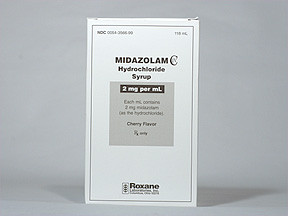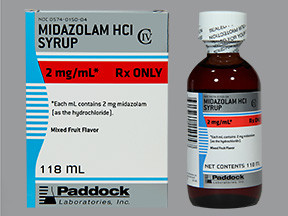MIDAZOLAM - ORAL SYRUP
PHONETIC PRONUNCIATION: (mid-AZE-oh-lam)
COMMON BRAND NAME(S): Versed
GENERIC NAME(S): midazolam HCl
Uses
USES: This medication is used in children before a procedure or anesthesia to cause drowsiness, decrease anxiety, and cause forgetfulness of the surgery or procedure. It should be used while the child is under the care of a health professional. It is not for home or long-term use. Midazolam belongs to a class of medications called benzodiazepines, which produce a calming effect on the brain and nerves (central nervous system). It is thought to work by increasing the effect of a certain natural chemical (GABA) in the brain.
How to use MIDAZOLAM - ORAL SYRUP
HOW TO USE: A healthcare professional will prepare and measure your dose. Take this medication by mouth as directed by your doctor. It is usually given as a single dose before a procedure or anesthesia. The dosage is based on your medical condition, response to therapy, weight, and other medications you may be taking. This medication may cause withdrawal reactions, especially if it has been used regularly for a long time or in high doses. In such cases, withdrawal symptoms (such as shaking, sweating, vomiting, abdominal/muscle cramps, seizures) may occur if you suddenly stop using this medication. To prevent withdrawal reactions, your doctor may reduce your dose gradually. Consult your doctor or pharmacist for more details, and report any withdrawal reactions right away. Though it helps many people, this medication may sometimes cause addiction. This risk may be higher if you have a substance use disorder (such as overuse of or addiction to drugs/alcohol). Do not increase your dose, take it more often, or use it for a longer time than prescribed. Talk with the doctor if this medication stops working well. Properly stop the medication when so directed. Avoid eating grapefruit or drinking grapefruit juice while being treated with this medication unless the doctor instructs you otherwise. Grapefruit can increase the amount of certain medications in the bloodstream. Consult the doctor or pharmacist for more details.
Side Effects
Precautions
Interactions
Overdose
Images
Reviews
Warning
WARNING: Midazolam has rarely caused very serious breathing problems (such as rapid/slow/shallow breathing, trouble breathing), especially if used with other medications that cause drowsiness (including opioid medications such as morphine). This medication should be used only in a hospital or medical office under the care of a health professional. See also Side Effects section.
Disclaimer
IMPORTANT: HOW TO USE THIS INFORMATION: This is a summary and does NOT have all possible information about this product. This information does not assure that this product is safe, effective, or appropriate for you. This information is not individual medical advice and does not substitute for the advice of your health care professional. Always ask your health care professional for complete information about this product and your specific health needs.



No Reviews Yet